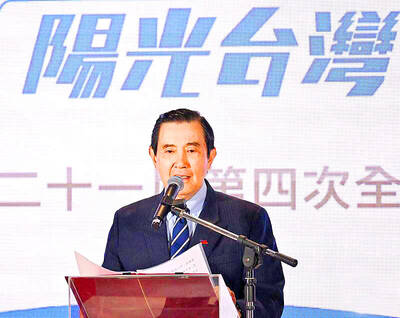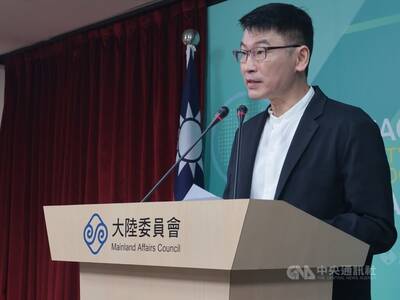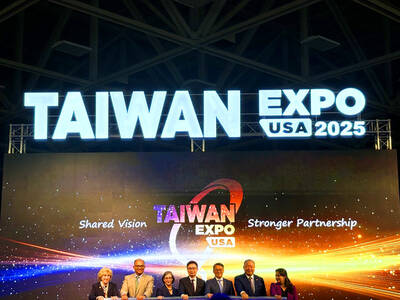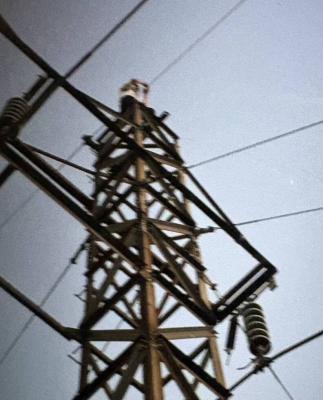The first wave of Cabinet appointments has received mixed reviews. While some have been highly critical of the “old faces,” others have praised their expertise on financial matters.
Taiwan Thinktank chairman Chen Po-chih (陳博志), who served as former president Lee Teng-hui’s (李登輝) economic adviser, shared his concerns during an interview with the Taipei Times.
“I sincerely hope my old friends do not make the same mistakes they did when the Chinese Nationalist Party [KMT] was in power [before],” Chen said.

PHOTO: LO PEI-DER, TAIPEI TIMES
One of these mistakes was to create a bubble economy, which, he said, still haunts the country.
In the 1980s and 1990s, the KMT administration allowed new banks to be established, public and private financial institutions to lend excessive amounts of money and mapped out far-fetched infrastructure projects, he said.
Too many houses were built during that period, he said. On average, only 80,000 homes were needed each year. A 2001 survey found that 1.24 million newly constructed homes were empty, he said.
Moreover, financial institutions lent more than NT$4 trillion (US$131.85 billion) more than usual during that period. The money financial institutions lent accounted for 27 percent of GDP, leaving the Democratic Progressive Party (DPP) administration with NT$1.8 trillion in bad performing loans, he said.
To win votes, the KMT administration also cut taxes. While tax revenues contributed to 18 percent of GDP in the 1980s, Chen said, the figure dropped to 13 percent in 2000. With less tax income, the government had to borrow more and ended up deeper in debt, he said.
Politicians like to talk about tax cuts because they have public appeal, he said. But when taxes are cut, the government must find money from somewhere else, he said, which often leads to an increase in other taxes.
While Lee called Paul Chiu (邱正雄) the “best finance minister ever,” Chen dismissed this as “political language” from a supervisor to his underling, which should not be taken too seriously.
Lee commended many of his subordinates, including Wu Tse-yuan (伍澤元), Chen said. The former KMT legislator was later convicted of corruption. Former KMT chairman Lien Chan (連戰) had loaned him US$1 million for election campaigns. Wu skipped bail, left the country and has not been seen since.
Chiu described the DPP administration’s botched “second-stage financial reform” as being correct in its aims, adding that the procedure must be fair, open and that negotiations must abide by market mechanisms.
Chen said he agreed that negotiations must follow market mechanisms and that the DPP administration had made two mistakes in that regard.
First, the DPP administration did not offer a clear account on whether smaller banks would be allowed to exist.
Second, it offered too clear an account of how many state banks it wanted to keep and when it wanted to meet the target.
The DPP administration began promoting the “second-stage financial reform” in October 2004. The scheme sought to consolidate the nation’s overcrowded banking sector. It was aborted during the term of former premier Su Tseng-chang (蘇貞昌) in 2006 because of mounting public criticism.
The reform plan had four goals: Halving the number of state banks to six by the end of 2006; reducing the number of financial groups to seven by the end of last year; having at least one local bank taken over by a foreign competitor; and having at least three local lenders with a market share exceeding 10 percent.
Only two targets have been met: State banks have been reduced to half their number and Standard Chartered Bank has acquired Hsinchu International Bank.
Commenting on Ma’s “633” economic policy and the “i-Taiwan 12 projects,” Chen said they required a complete overhaul.
Construction projects, Chen said — especially ill-planned ones — should not be used to boost economic growth or tackle unemployment. The nation’s economic growth rate was not too bad, reaching 5.7 percent last year, while unemployment was quite impressive, at about 3 percent, he said.
The “633” policy refers to 6 percent economic growth rate, US$30,000 per-capita income by 2016 and less than 3 percent unemployment.
Chen dismissed Ma’s promise to increase the national income to keep up with the rise in property value as wishful thinking, because under a bubble economy, he said, it would be almost impossible to increase the national income to the level of inflation.
Some have expressed concern over Ma being overly friendly with big business, but Chen said this was not a major problem, as big business is after all a major sector of the economy.
However, it is important that the Ma administration pay equal attention to medium and small enterprises as well as disadvantaged groups. What is more important is that the KMT administration make sure that its legislators and local chiefs do not make the same mistake of colluding with big businesses for personal gain.
Incoming minister of economic affairs Yiin Chii-ming (尹啟銘) has said the new administration would seek to ease regulations in the next two years and adjust local economies within four years.
Chen said that those who blamed the nation’s “sluggish economy” on the DPP administration’s cross-strait economy policy were either “ignorant” or had a specific political agenda.
No country ever set a ceiling on China-bound investment as high as 40 percent, Chen said, adding that while other countries’ exports to China accounted for about 20 percent of their overall exports, Taiwan’s was 40 percent.
Official statistics show that Taiwan’s investment in China accounts for 2 percent of its GDP, much higher than that of Japan or the US, he said.
“If my old friends think that the country’s ‘sluggish economy’ results from the DPP administration’s cross-strait economic policy, they are making a very big mistake,” he said.
“I don’t know whether it is electoral language or ignorance of reality, [but] it is wrong to think that the country’s economy will be better if we pin all our hopes on China,” he said.

‘ANGRY’: Forgetting the humiliations and sacrifices of ‘the people of the Republic of China’ experienced disqualified Lai from being president, Ma Ying-jeou said Former president Ma Ying-jeou (馬英九) yesterday criticized President William Lai (賴清德) over what he called “phrasing that downplayed Japan’s atrocities” against China during World War II. Ma made the remarks in a post on Facebook on the 80th anniversary of the end of World War II. Ma said he was “angry and disappointed” that Lai described the anniversary as the end of World War II instead of a “victory in the war of resistance” — a reference to the end of the Second Sino-Japanese War (1937-1945). The eight-year war was a part of World War II, in which Japan and the other Axis

The Mainland Affairs Council (MAC) yesterday announced a ban on all current and former government officials from traveling to China to attend a military parade on Sept. 3, which Beijing is to hold to mark the 80th anniversary of the end of the Second Sino-Japanese War. "This year marks the 80th anniversary of the end of World War II and the Republic of China’s victory in the War of Resistance [Against Japan]," MAC Deputy Minister and spokesperson Liang Wen-chieh (梁文傑) told a regular news briefing in Taipei. To prevent Beijing from using the Sept. 3 military parade and related events for "united

‘OFFSHORE OPERATIONS’: Also in Dallas, Texas, the Ministry of Economic Affairs inaugurated its third Taiwan Trade and Investment Center to foster closer cooperation The 2025 Taiwan Expo USA opened on Thursday in Dallas, Texas, featuring 150 Taiwanese companies showcasing their latest technologies in the fields of drones, smart manufacturing and healthcare. The Taiwan External Trade Development Council (TAITRA), the event’s organizer, said the exhibitors this year include Hon Hai Precision Industry Co (Foxconn), the world’s largest contract electronics manufacturer; AUO; PC brand Asustek Computer; and drone maker Thunder Tiger. In his opening speech, TAITRA chairman James Huang (黃志芳) said he expected Texas to become a world-class center for innovation and manufacturing as US technology companies from Silicon Valley and Taiwanese manufacturers form an industrial cluster

A 20-year-old man yesterday evening was electrocuted and fell to his death after he climbed a seven-story-high electricity tower to photograph the sunset, causing a wildfire on Datong Mountain (大同山) in New Taipei City’s Shulin District (樹林), the Taoyuan Police Department said today. The man, surnamed Hsieh (謝), was accompanied on an evening walk by a 20-year-old woman surnamed Shang (尚) who remained on the ground and witnessed the incident, capturing a final photograph of her friend sitting atop the tower before his death, an initial investigation showed. Shang then sought higher ground to call for help, police said. The New Taipei